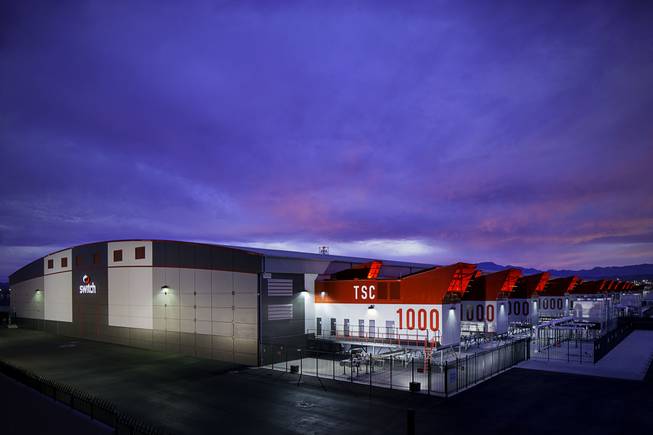
Courtesy of Switch
Switch SUPERNAP.
Wednesday, May 13, 2015 | 2 a.m.
In an opinion expected to be widely disputed by both consumer groups and advocates of competitive energy marketplaces, the Nevada Public Utilities Commission's legal staff has ruled that a major digital technology company must pay $27 million to cut its ties with NV Energy and produce its own power.
The legal staff's ruling sets the stage for debate about consumer choice and the interpretation of a 14-year-old law that the company, Switch, is referencing in hopes of removing itself as an NV Energy customer. The PUC's legal opinion could foreshadow a decision that regulators will formally announce in June, and could be an indication that it will be difficult for Switch and other companies to unplug from NV Energy. In interpreting the law, the regulators' legal staff in essence said the opt-out provision should be ignored now because market conditions have changed since it was enacted.
The PUC opinion is the latest in a six-month battle for Switch, which applied in November with the PUC for the ability to create and purchase power without NV Energy. The Las Vegas-based company provides data storage to an array of Fortune 1000 clients, including Google, Sony and Ebay, through a high-bandwidth fiber optic network connected to at least four dozen major Internet providers.
Energy is the most expensive part of Switch's operational costs, and the company contends it pays 30 percent more in Nevada than its competitors spend for energy in nearby states.
Switch, which was hoping to pay $9 million less than the PUC recommended, filed a response to the brief and will file another rebuttal in the coming days.
The company’s push is in the forefront of a revived effort by the state’s influential companies to purchase and create power without the utility.
The PUC's legal opinion could set a strict precedent for casino and resort companies currently attempting to leave NV Energy and is the latest news in an ongoing debate about consumer choice in a marketplace controlled by the utility, which is a regulated monopoly.
The majority of the PUC’s legal opinion interprets a 2001 Nevada law allowing companies that consume more than 1 megawatt of power per year to create or purchase energy from sources other than the utility's. The law was an effort to provide large-scale power consumers with more options to sign into long-term purchasing agreements with non-utility energy providers and build their own power plants. It was passed during the California energy crisis spurred by Enron, the defunct energy company that manipulated power markets to create a false demand that led to shortages and skyrocketing power prices in Western energy markets.
Mining companies have taken advantage of the law and similar policies to build their own power plants since 2001. Many of the state’s gaming operations applied with the PUC to opt out of the system in the last decade but didn’t sever ties with the power company after regulatory vetting.
However, drastic changes in power production markets have triggered the new round of requests to purchase power from another provider. The market changes stemmed from new policies to help protect utilities from energy shortages and the nation's current domestic energy boom, brought on by fracking. NV Energy also has secured long-term power purchase agreements and built infrastructure that it formerly did not have, equating to more than 4,700 megawatts of generation capacity.
“The [utilities] were having difficulty obtaining purchase power from the energy markets under terms favorable to ratepayers [in 2001],” the PUC said in its legal brief. “In contrast, now, the [utilities] sell into western energy markets, and have no difficulty obtaining purchase power under terms favorable to ratepayers from the energy markets. The 2001 Legislature did not, and could not, have foreseen the immense change the [utilities] and the energy markets would undergo in the ensuing 14 years.”
In its response to the staff of the PUC, Switch said that under the statute, known in law as NRS 704b, the ability of a company to cut ties with NV Energy wasn't tied to market circumstances.
“There is no language that states that a customer may only be authorized to depart under circumstances similar to those enacted at the passage of [the law],” the response said. “The language rather allows all eligible customer applicants … If the Legislature intended to limit NRS 704b’s applicability to 2001-style market conditions, it would have written the statute to that effect.”
The PUC legal staff's opinion appeared to include at least one contradiction.
The PUC said a Switch exit would not provide a benefit to ratepayers under “modern market circumstances,” even with the $27 million exit fee. But the PUC also said that it would be a benefit if the company pays an exit fee.
Switch has vowed that if it can purchase and create its own power, it will be able to be 100 percent renewable in the coming years, saying in the response to the PUC that its competitors are doing the same.
The company said its customers are demanding that it move to renewables, saying that severing ties with NV Energy could help the company create "hundreds of construction jobs and thousands of permanent jobs in Nevada.”
The debate about job creation and the effects of large customers opting out of the system are likely to continue in Nevada.
Earlier this month, Wynn Resorts and Las Vegas Sands filed applications with the PUC to sever ties as customers of NV Energy. MGM Resorts International and Caesars Entertainment are expected to go public soon with their own requests.

Join the Discussion:
Check this out for a full explanation of our conversion to the LiveFyre commenting system and instructions on how to sign up for an account.
Full comments policy